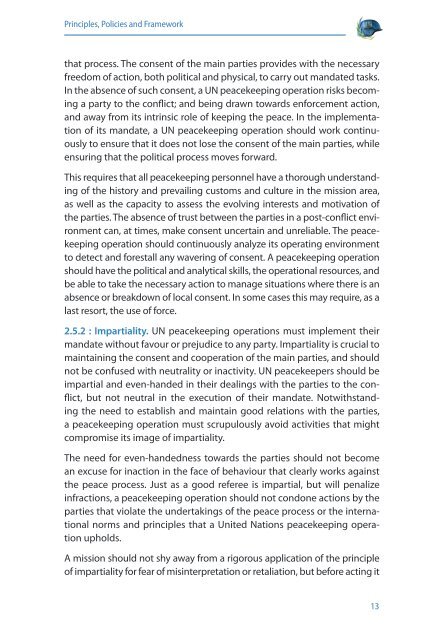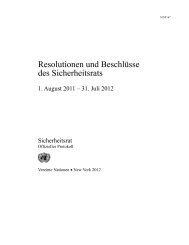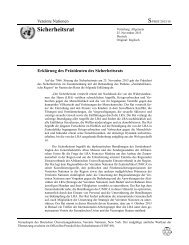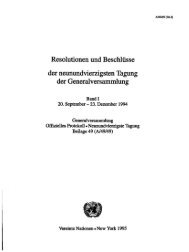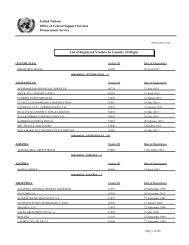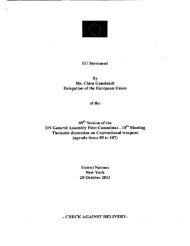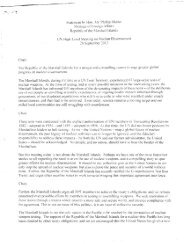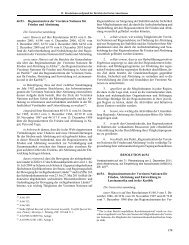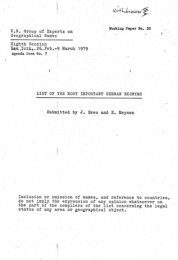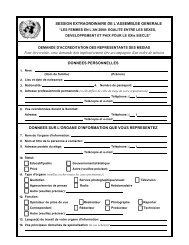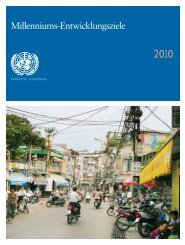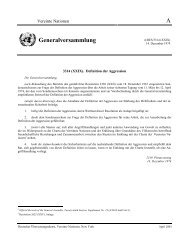United Nations Infantry Battalion Manual - the United Nations
United Nations Infantry Battalion Manual - the United Nations
United Nations Infantry Battalion Manual - the United Nations
You also want an ePaper? Increase the reach of your titles
YUMPU automatically turns print PDFs into web optimized ePapers that Google loves.
principles, policies and framework<br />
that process. The consent of <strong>the</strong> main parties provides with <strong>the</strong> necessary<br />
freedom of action, both political and physical, to carry out mandated tasks.<br />
In <strong>the</strong> absence of such consent, a UN peacekeeping operation risks becoming<br />
a party to <strong>the</strong> conflict; and being drawn towards enforcement action,<br />
and away from its intrinsic role of keeping <strong>the</strong> peace. In <strong>the</strong> implementation<br />
of its mandate, a UN peacekeeping operation should work continuously<br />
to ensure that it does not lose <strong>the</strong> consent of <strong>the</strong> main parties, while<br />
ensuring that <strong>the</strong> political process moves forward.<br />
This requires that all peacekeeping personnel have a thorough understanding<br />
of <strong>the</strong> history and prevailing customs and culture in <strong>the</strong> mission area,<br />
as well as <strong>the</strong> capacity to assess <strong>the</strong> evolving interests and motivation of<br />
<strong>the</strong> parties. The absence of trust between <strong>the</strong> parties in a post-conflict environment<br />
can, at times, make consent uncertain and unreliable. The peacekeeping<br />
operation should continuously analyze its operating environment<br />
to detect and forestall any wavering of consent. A peacekeeping operation<br />
should have <strong>the</strong> political and analytical skills, <strong>the</strong> operational resources, and<br />
be able to take <strong>the</strong> necessary action to manage situations where <strong>the</strong>re is an<br />
absence or breakdown of local consent. In some cases this may require, as a<br />
last resort, <strong>the</strong> use of force.<br />
2.5.2 : Impartiality. UN peacekeeping operations must implement <strong>the</strong>ir<br />
mandate without favour or prejudice to any party. Impartiality is crucial to<br />
maintaining <strong>the</strong> consent and cooperation of <strong>the</strong> main parties, and should<br />
not be confused with neutrality or inactivity. UN peacekeepers should be<br />
impartial and even-handed in <strong>the</strong>ir dealings with <strong>the</strong> parties to <strong>the</strong> conflict,<br />
but not neutral in <strong>the</strong> execution of <strong>the</strong>ir mandate. Notwithstanding<br />
<strong>the</strong> need to establish and maintain good relations with <strong>the</strong> parties,<br />
a peacekeeping operation must scrupulously avoid activities that might<br />
compromise its image of impartiality.<br />
The need for even-handedness towards <strong>the</strong> parties should not become<br />
an excuse for inaction in <strong>the</strong> face of behaviour that clearly works against<br />
<strong>the</strong> peace process. Just as a good referee is impartial, but will penalize<br />
infractions, a peacekeeping operation should not condone actions by <strong>the</strong><br />
parties that violate <strong>the</strong> undertakings of <strong>the</strong> peace process or <strong>the</strong> international<br />
norms and principles that a <strong>United</strong> <strong>Nations</strong> peacekeeping operation<br />
upholds.<br />
A mission should not shy away from a rigorous application of <strong>the</strong> principle<br />
of impartiality for fear of misinterpretation or retaliation, but before acting it<br />
13


